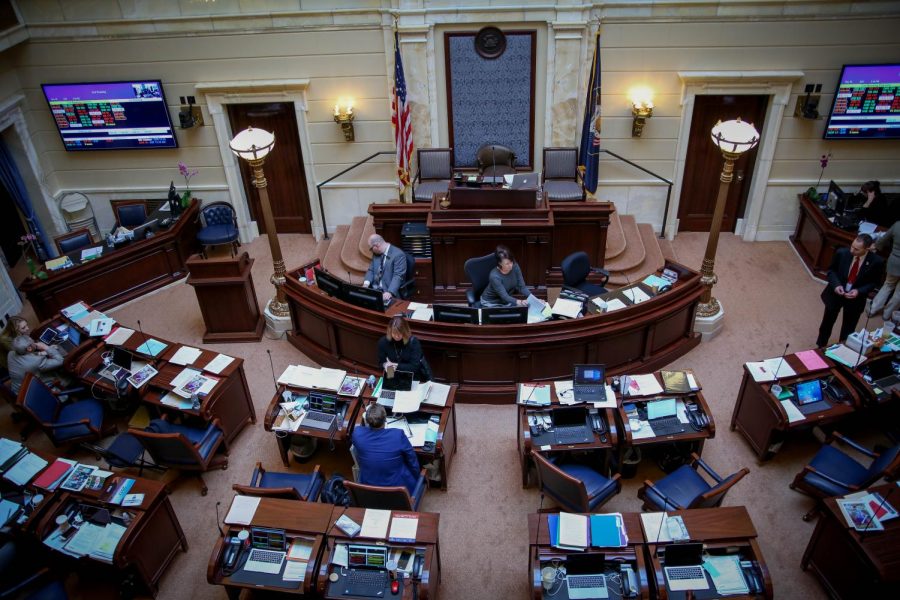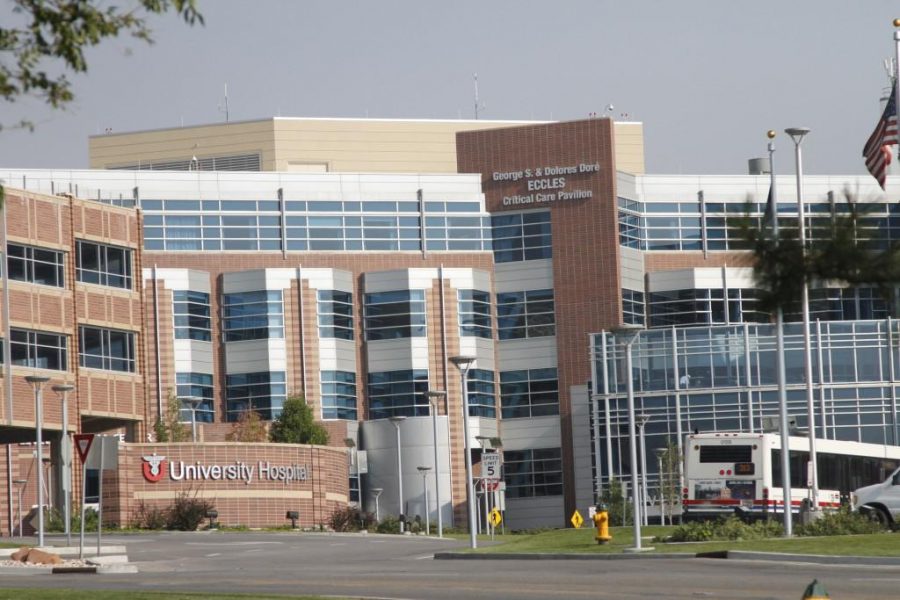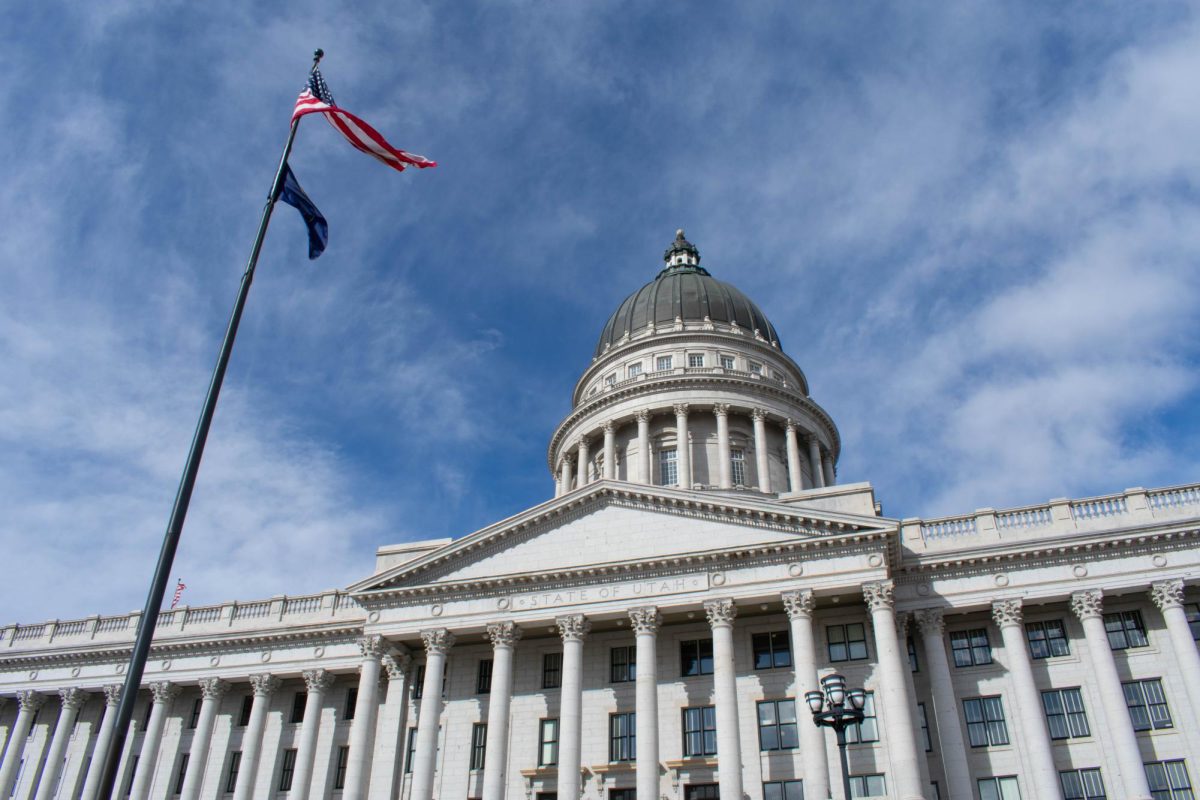Poma: Utah Leaders, Stop Treating COVID-19 Like a Purely Economic Issue
Legislative meeting at the Utah Capital building in Salt Lake City, Utah on Friday, Feb. 23, 2018. (Photo by Cassandra Palor | Daily Utah Chronicle)
August 28, 2020
Let’s face it — the coronavirus pandemic is far from over. Health guidelines such as social distancing and masks are still in place, which caused cases to decline in Utah in recent weeks. However, recent reports show that instead of treating COVID-19 as a health issue, our lawmakers have prioritized the political and economic ramifications of the virus over those pertaining to Utahns’ physical well-being. The economic health of our state and municipalities certainly matters. But ignoring experts’ recommendations in favor of monetary concerns has perhaps caused this crisis to continue for longer than it should have. As we move into the fall, Utah needs to adjust how quickly it proceeds to open the state and what it will cost its people — not just its economy.
In prioritizing the economy, Utah lawmakers failed to evaluate what opening up too soon would mean for Utahns. The Utah Legislature’s decision to reopen in May made it clear that the spike in cases that could and did occur didn’t matter to them, as long as the economy could get back in shape. Utah’s case count chart indicates that cases surged when things began to reopen, and before state and country leaders put mask mandates in place. Instead of asking how to stop the spread, the legislature essentially asked how much our hospitals could handle, which is disgusting.
The state’s neglect doesn’t stop here. On the whole, people have resisted slow reopening processes and safety mandates in Utah and across the US. Even though social distancing and mask mandates clearly reduce the spread of COVID-19, the public and lawmakers still want everything — including the economy — to somehow return to normal. But that’s not possible for the foreseeable future. If we focus exclusively on the political and economic results of reopening, we could cause more damage to the economy by prolonging the recovery within the state, both in terms of the economy and public health. In April, the New York Times published an op-ed by Aaron E. Caroll that explains that the only way to properly open the economy is to ensure the safety of the people who run it — workers and customers. As such, public health risks must be carefully examined before any policies or regulations are approved.
After all, the entire purpose of an economy is to ensure our quality of life. The economy can’t run smoothly if people are scared to go back to work or the store. It also can’t run if the people who stimulate the economy fall ill because they tried resuming normal productivity too soon. We can’t talk about economics and coronavirus without factoring in people’s health, so it’s baffling that Utah’s government has ignored and sought to justify the illness of so many people in our community.
For instance, people stay home from work because they’ve contracted the virus or have lost loved ones to the virus. Medical bills and funeral arrangements can rack up debts that can’t be paid due to job loss. Virus-related debts include everything from evictions, credit card debt from pre-coronavirus days, and accumulating student debt. These financial challenges will only continue if states continue opening too quickly, and these forms of virus-related debt are already predicted to severely affect our livelihoods for years to come.
Our legislature needs to focus on reserving and raising Utahns’ quality of life as much as maintaining a healthy economy. And that task isn’t feasible when reopening involves all of these concerns, not to mention death and loss of friends and family members. Caroll concludes his article with a statement that everyone, politicians included, should bear in mind going forward: “Economists and public health experts aren’t on different sides here. The way to save the economy is to do everything public health experts are asking for. As an added bonus, it will also save a lot of lives.”
A wide range of arguments in favor of reopening the economy — both in Utah and nation-wide — have cropped up throughout the pandemic. Arguments vary from masks and social distancing not helping since cases still exist to the fact that the flu never shut down the economy. These arguments don’t recognize that slowing down our reopening doesn’t mean shuttering up and being afraid of the virus. We can still open up businesses, as we’ve seen done in Arizona, but be firm in restrictions and a slower reopening process. 2020 might be a “lost year” for Utah’s economy, and many businesses have suffered significant losses because of the pandemic. However, with the virus still at large, a temporarily weakened economy is better than having a lost generation of people who could’ve been saved had we opened up a little bit slower.
Recently, Governor Herbert had to go over the legislature’s heads to extend Utah’s state of emergency after lawmakers refused to do so. This ongoing disregard for the consequences of COVID-19 sends the wrong message, as did the decision to reopen the economy. Thankfully, the governor recognized the need to reissue the state of emergency, so people continue to be cautious as they go back to work and school.
It’s important during this crisis to prioritize the health and safety of others; our legislature’s misguided focus in addressing the pandemic should prompt us to reevaluate our priorities going forward. Without healthy people, we can’t sustain a public space for people to buy and sell, so we can’t have a healthy economy. As we continue into the latter half of 2020 with COVID-19, we can only hope that Utah leaders will start to factor in our health.











